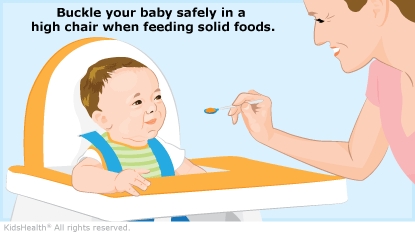Feeding Solids to Your Baby
At first, babies only need breast milk or formula to grow and thrive. At around 4–6 months, most babies are ready to start eating solids too. Babies who are ready to start solids:
-
can sit up
-
can control their head and neck
-
seem interested in food
-
can lean back or turn the head when full
-
no longer have the tongue-thrusting reflex where they push their tongue out when anything is placed between their lips
Here are some tips for starting your baby on solid foods.




-
Your baby has a rash, diarrhea, vomiting, or fussiness.
-
Your baby is more than 6 months old and still won't take any solid foods.

Or call 911 if your baby has signs of a serious allergic reaction, such as wheezing, trouble breathing, hives, or looking extremely pale.

Will feeding foods like fish, peanut butter, and scrambled eggs make my baby more likely to develop a food allergy? In the past, experts thought that babies should not get these foods until after the first birthday. But recent studies suggest that waiting that long could make a baby more likely to develop food allergies. Even babies with family members who have food allergies can try these foods when they start solids.
Can I make my own baby food? You can make your own baby food at home by puréeing foods with a food processor or blender. Here are some things to keep in mind:
-
Wash your hands well before handling food.
-
Preserve the nutrients in your baby's food by steaming or baking instead of boiling.
-
Freeze foods that you aren't going to use right away rather than canning them.